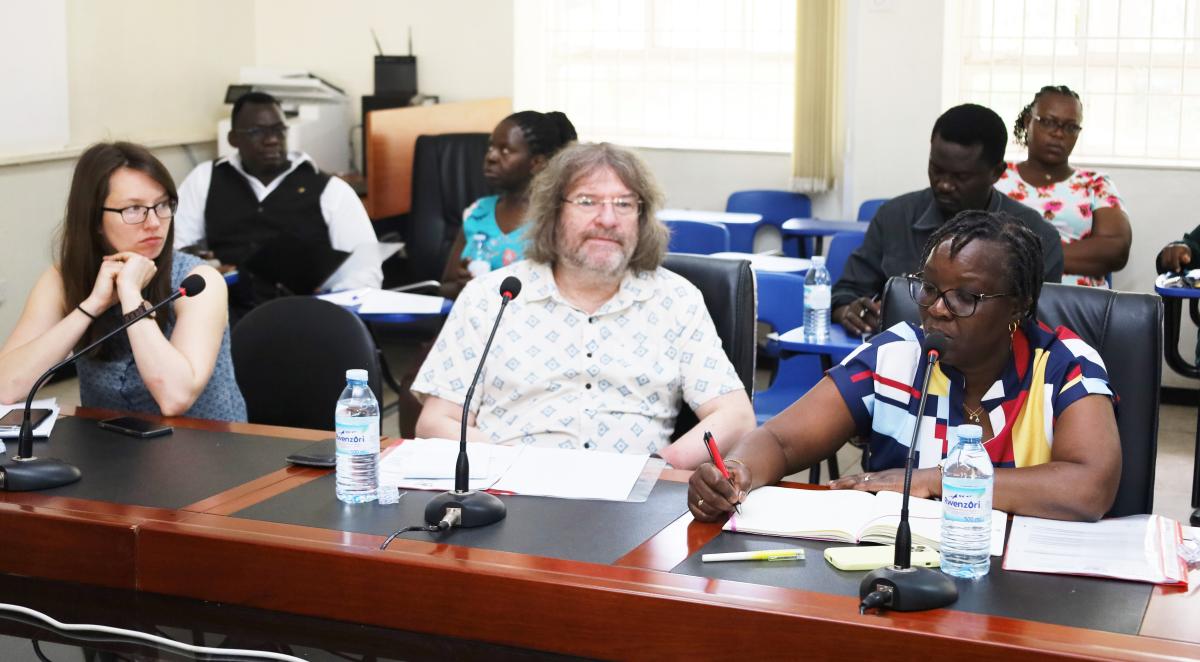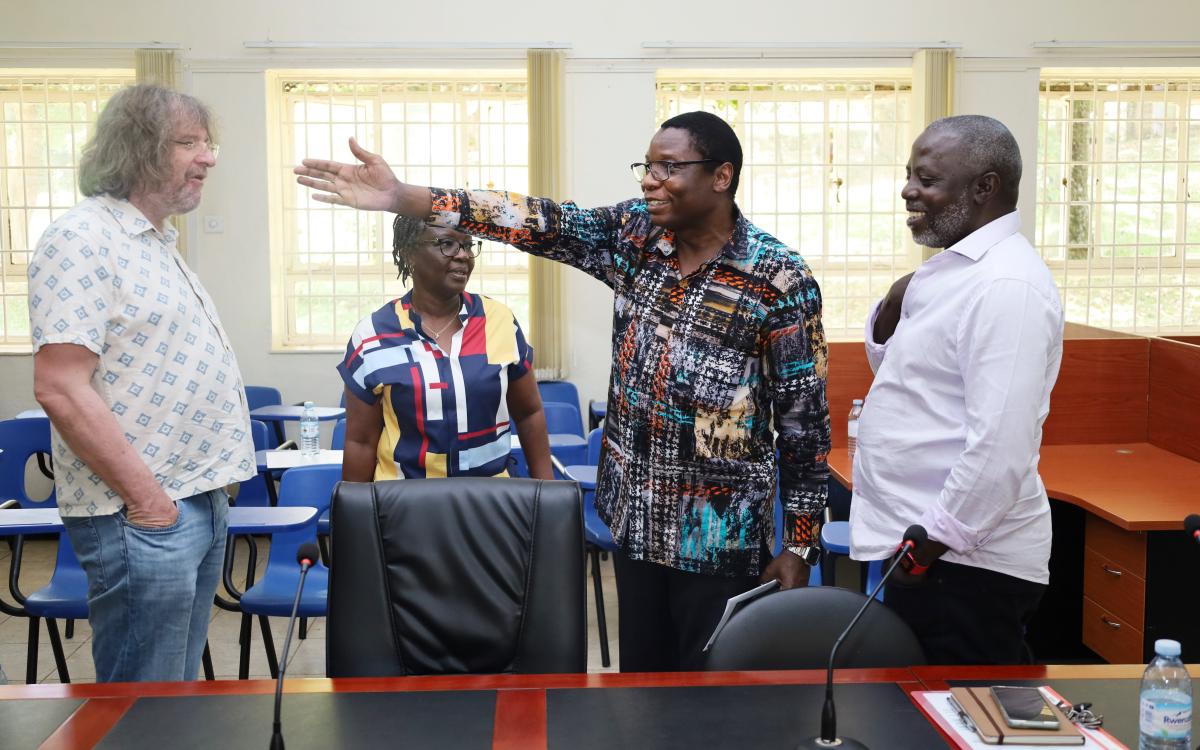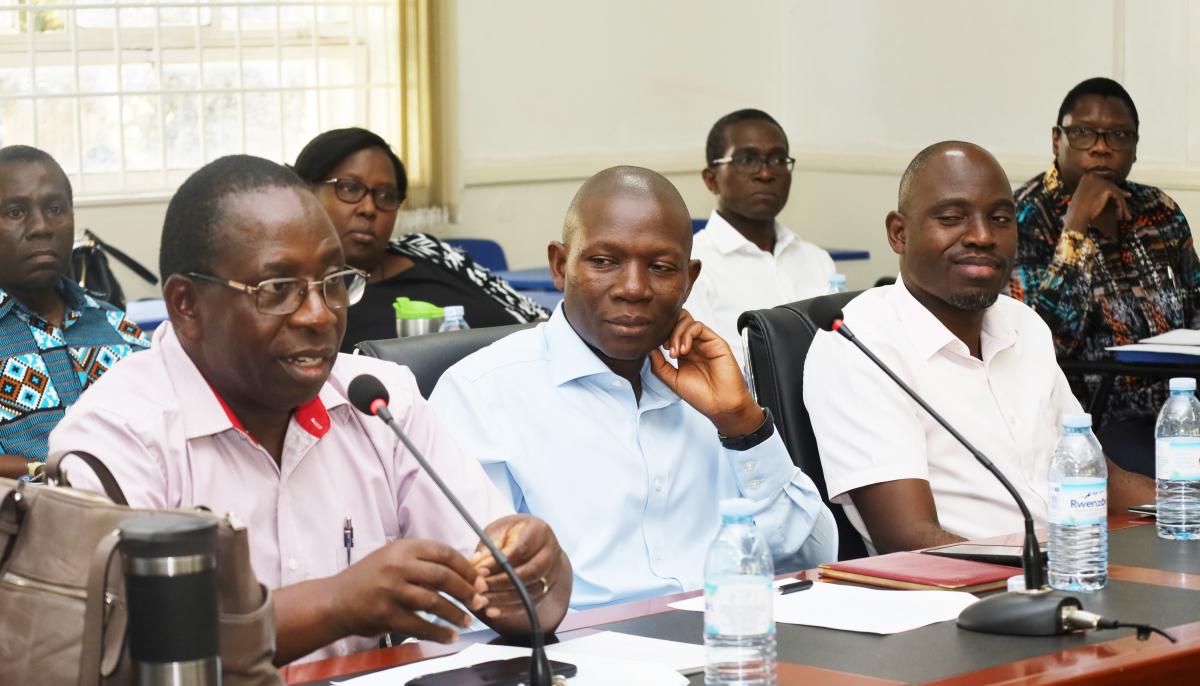
A team of Evaluators from the Gerda Henkel Foundation has commended the College of Humanities and Social Sciences (CHUSS) for implementing the Lisa Maskel Fellowships saying, it has revived the Humanities at Makerere University.
Two Evaluators Dr. Joyce Nyairo and Prof. Andreas Eckert led by the Program Coordinator for the Gerda Henkel Foundation in Germany Ms. Jane Frey, had a three days engagement (26th-29th May 2023) with university top management, the Directorate of Graduate Research and Training, the CHUSS project steering committee, current fellows and alumni as well as the heads and Graduate studies coordinators in CHUSS.
 The reason for these engagements was that this programme has been in existence for ten years starting at the university Stellenbosch, then Makerere university and the University of Ghana which has been the last to join.
The reason for these engagements was that this programme has been in existence for ten years starting at the university Stellenbosch, then Makerere university and the University of Ghana which has been the last to join.
Dr. Joyce Nyairo said, Gerda Henkel Foundation evaluates their projects after 10 years and the issue has been to go round to each one of the universities and Makerere has been the last one after Ghana and Stellenbosch. Dr. Joyce Nyairo, Prof Andreas Eckert and Ms. Jane Frey met the CHUSS Heads of Departments and Graduate Studies Coordinators on 29th May 2023 in the CHUSS Smart room.
“We are here to find out how Makerere is doing on this program not because the funding must be brought to an end but because all funding projects have the capacity for improvement. What we were interested in were the lessons that have been learnt, the challenges experienced and how you are trying to overcome them. We want to see some innovations made, what lessons can be shared with other universities and where you need stronger collaboration”, Dr. Nyairo explained.
The discussions focused on aspects like supervisors and student’s needs, the need for expertise and sufficient capacity for multidisciplinary research, students’ foundational knowledge that can enable them undertake quality PhD, how the university was dealing with plagiarism, students health and ability to complete within the prescribed study period and solutions.
 Dr. Nyairo described the conversation with the faculty, coordinators and supervisors as fairly candid. Besides giving extensive gratitude for the scholarship, Dr. Nyairo said the foundation would like to see students who have the capacity for criticism and critical judgement.
Dr. Nyairo described the conversation with the faculty, coordinators and supervisors as fairly candid. Besides giving extensive gratitude for the scholarship, Dr. Nyairo said the foundation would like to see students who have the capacity for criticism and critical judgement.
“We have had fantastic conversations with the faculty talking about the intellectual scoop, how it has been impacted by a program like this, the implications for expansion, what is sacrificed and what can be gained. So, it has been a good three days of engagement. From here, we shall make our report as evaluators to Gerda Henkel Foundation and then they decide what changes to make”, Nyairo appreciated and commended CHUSS for implementing the project.
“It is gratifying to see how the humanities have been revived at Makerere University. It is great that the university is benchmarking other programmes based on what CHUSS is doing in this programme”.
I want to see Makerere university take on the burden of this PhD programme and begin to support some of the things and not rely on donor funds that’s how we will know that the program has been entrenched and has great impact”, Dr. Nyairo added.
CHUSS Projects Coordinator Dr. Edgar Nabutanyi said, by the time the project closes, it would have trained 58 PhDs in Historical Humanities and Humanistic Social Sciences.
Dr. Nabutanyi said the CHUSS-Gerda Henkel Foundation PhD Training partnership sought to achieve three goals namely: - to assist the college reclaim the tattered image of the Humanities in the public and private tertiary institutions in the region. Second, to train the next generation of Humanities scholars to replenish the disciplines lest they die out and third, to equip the next generation of Humanities scholars with intellectual and investigative skills that can be deployed in studying the human condition in their respective societies in order to delineate the elusive concept of what it takes to ensure a good life.
“The above broad aims of the partnership have been actualised in form of the recruitment of 6 cohorts or 60 PhD Fellows from different Historical Humanities and Humanistic Social Sciences disciplines from various universities in Uganda and Sub-Saharan Africa”, Nabutanyi explained
He said from 2017, the college received funding to train a total of 60 PhD fellows for four major cost items related to PhD training in the Historical Humanities and Humanistic Social Sciences such as tuition, stipend, medical insurance, laptop computer, books, travel to take up the fellowship, conference attendance and field work funds. The partnership also funded travel, personnel costs and research or PhD training costs such as buy-in-time, research workshops, retooling seminars and the CHUSS symposium.
 Dr. Nabutanyi also reported that 9 Fellows of the 2017 cohort did complete their studies and graduated during the 2021, 2022 and 2023 Makerere, Similarly, 6 Fellows of the 2018 cohort did complete and graduated during the 2022 and 2023 Graduation ceremonies. 2 Fellows have submitted their theses and await examination.
Dr. Nabutanyi also reported that 9 Fellows of the 2017 cohort did complete their studies and graduated during the 2021, 2022 and 2023 Makerere, Similarly, 6 Fellows of the 2018 cohort did complete and graduated during the 2022 and 2023 Graduation ceremonies. 2 Fellows have submitted their theses and await examination.
3 Fellows of the 2018 cohort, are expected to submit during the second half of this year and only one fellow among the 2019 cohort, has submitted his thesis for examination while the remaining 9 have not yet completed their studies 6 months after the lapse of their funding.
Nabutanyi partly attributed the poor rate of completion among the 2018 and 2019 cohorts to the impact of COVID-19 of their studies adding that the 2018 cohort got supplementary COVID funding hoping to organise a similar intervention for the 2019 cohort.
The funding according to Dr. Nabutanyi had an indicative budgetary component of USD 55,600 that was earmarked for material, equipment, and renovations expenses for the college.
The funding as reported by Dr. Nabutanyi has also supported and/or allowed the college to innovate regarding an intellectual/scholarly infrastructure.
CHUSS & Funders discuss possible extension of the PhD study period
Dr. Nabutanyi noted that the college and funders have noted the challenges that come with the time of three years to complete the PhD and going forward, the timeline is going to be reviewed so that the interests of the students and the funders and the college are taken care of.
Speaker after speaker commended the program for the positive attributes and made contributions on how the three -year PhD sholarship and time line was impacting on the program beneficiaries and supervisors.
“The funded students have a specific time within which to complete their programme and the work is scheduled. With these funds, students are given seminars where academic writing, research methodology and other aspects of their PhD are taught”, Dr. Charlotte Mafumbo.
 Dr. Elizabeth Kyazike expressed gratitude for the Gerda Henkel funding on grounds that it has opened up opportunities for funding non- priority program like archaeology, noting that it has been difficult to find archaeologists with PhDs in Uganda.
Dr. Elizabeth Kyazike expressed gratitude for the Gerda Henkel funding on grounds that it has opened up opportunities for funding non- priority program like archaeology, noting that it has been difficult to find archaeologists with PhDs in Uganda.
“Archaeologists do a lot of experiments and to do an internationally recognised PhD within three years is not possible. In archaeology, the pressure is immense and the sacrifice is the health of students who are almost running crazy given the university requirement that they must publish in order to graduate,” Dr. Elizabeth Kyazike submitted.
“The period given is three-five years and indeed some people have done it in three years but bear in mind that it has impact on the quality of the product because we have year one of proposal writing, so we have two years which is likely to have impact on the quality of the PhD”. Another Lecturer submitted.
Dr. Lutwama – Rukundo Evelyn noted that, although the project has a strong coordination unit ensuring that students meet the deadlines, submit progress reports and organise seminars, the three- year scholarship limit also affects the mental health of supervisors.
““The three-year constraint also impacts on the mental health of supervisors who have to balance supervision of the PhDs, teaching masters and undergraduate students, conducting research, publications, community services and attracting funding, and meeting social obligation inclusive”, Dr. Lutwama – Rukundo Evelyn.
To Dr. Zaid Sekito, it is possible to complete a PhD in three years because many have made it but the only challenge is that students abscond and forget they are full time and fully funded. “We need to change the mindset of students to know that they are full tine irrespective of whether they are nationals or foreign” Dr, Sekito said.
Dr. Orikiriza Celestino noted that although the program has brought on board PhD students for faculty for mentorship and an almanac that is followed leading to improvements, the sacrifice that comes with the three year limit is the scope of the study. “From my students experience, we are supposed to do three dimensions of the scope of the study but we ended up doing only one because the student had to finish within the funding period.” Prof. Wamala said.
 Prof. Peter Atekyereza commended Gerda Henkel Foundation for providing funds for the most neglected areas but noted that there is a challenge of completing in three years when one is a fully funded student at home with many competing needs resulting into mental illness but noone declares.
Prof. Peter Atekyereza commended Gerda Henkel Foundation for providing funds for the most neglected areas but noted that there is a challenge of completing in three years when one is a fully funded student at home with many competing needs resulting into mental illness but noone declares.
Citing his student conducting a study on engendering military on peace missions from different states, Atekyereza said it was challenging to get interviews from states to produce data worth a PhD within the three-year study time.
“There are social and emotional risks that is why students suffer in silence and are not willing to declare that they are mentally ill because it has implications for work, the family and public image” Dr. Atekyereza added
Dr. Roscoe Kasuja submitted that very few people finish PhDs in three years and those who succeed go through mental stress and are unhappy.
.“The sacrifice is the mental health of the student. I want a scholar to discover and explore who they are. Sometimes they should be granted breaks. I always don’t see people who are happy because there is too much pressure. Context is key but what about the well-being of the student and the stress experienced by the supervisor. We want to restore the dignity of the scholar and let us make academic writing fun”, Dr. Kasuja suggested.
Details of the report about the project milestones is attached.
